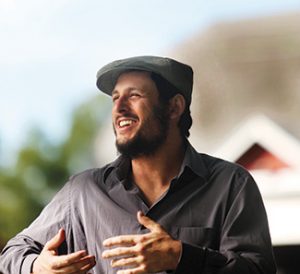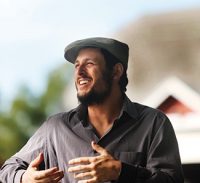Return to the Land; Return to the Tradition
This week’s post is by Rabbi Justin Goldstein, the Scholar-in-Residence of Yesod Farm+Kitchen, a small regenerative farm and educational space, in Fairview, NC.
The four propositions presented by Rabbi Sid’s Jewish Megatrends essay pretty accurately define the 
At Yesod Farm, our approach to text-based learning eagerly engages in difficult texts. Our hope is to engage intelligent individuals, regardless of their aptitude or familiarity with Jewish religious traditions. We find that our students are eager to explore the contemporary relevance of the ancient wisdom of Judaism as a lens through which to consider their own challenges today. While a lack of knowledge of Hebrew is intimidating to some, we concur with Rabbi Sid’s observation that Next Gen Jews crave Jewish authenticity. They want to be exposed to original Rabbinic sources. Providing people with accessible translations and explanations is far more impactful than utilizing simpler texts which may not actually address our contemporary questions with any depth. Furthermore, there has long been a sense that Jewish wisdom is only of value or interest to Jewish people. At Yesod Farm, we are dedicated to building community that is resilient and adaptive. Because the Jewish tradition is our universe of discourse, we use it with both our Jewish and our non-Jewish participants.
In addition to a learning community, Yesod Farm is a project founded upon building bridges across difference. One area in which this plays out is the way we engage both baby boomers and millennials in conversation. As it happens, people of both generations are drawn to Yesod Farm because of the way we model a sustainable approach to communities and the way we tread gently on the land on which we live. Both generations resonate strongly with the concept of social justice, but the language that is used to express that value by the different generations is quite distinct. Knowing that a commitment to tzedek, justice, sits at the center of all that we do at Yesod, does help to bridge the divide between generations and put each group into dialogue and relationship with one another.
At Yesod we are motivated by the principle that “humans cannot live on bread alone.” This is why, in addition to being a farm which grows produce, we also heavily invest our time, resources, and energy into feeding people and curating opportunities for people to relate to one another outside of educational environments. However, we recognize that this is not only a need for Jewish members of our community, but for all members of our community. One of the unintended consequences of the proliferation of smartphones is the absence of true, interactive, in-person, community engagement. This is the emphasis behind our referring to ourselves as Yesod Farm+Kitchen. In so many ways, the kitchen is the heart of a home (certainly in stereotypical Jewish homes). However, what happens in the kitchen is more than food preparation and consumption. The kitchen is a place for sharing stories, experiences, and relationships.
While the activities that happen on and around Yesod Farm are manifold, our mission is very clear. We are seeking to present models of regenerative agriculture, but we are also seeking to present models of creating regenerative community with the stated purpose of shifting how we conceive of ownership and property. Living with purpose is not exclusively about living a religious or spiritual life; it is also about living a life with meaning. By confronting the ramifications of capitalism and colonialism, we find that people begin to ask difficult questions of themselves which has the potential to motivate someone towards living a more mindful life with a deeper understanding of the unintended consequences of some of our choices as they relate to supporting hierarchical economies and cultures. Likewise, we find that when people have an opportunity to spend significant amounts of time outside and to participate in small-scale, communal food production, it imbues a sense of purpose and meaning in people’s lives.
In addition to the four propositions presented in Jewish Megatrends, I would add one more: embodiment. Judaism has long beem a heavily intellectualized pursuit with little to no physical embodiment. It is no wonder that so many have been drawn to traditions such as yoga, which helps a person connect to their body. At Yesod Farm, we believe in providing physical, experiential, educational opportunities which bring people into relationship with their body, the body of the earth, and a lived-experiential view of the wisdom of our tradition.
For example, instead of teaching people about matzah, or the counting of the omer, we help people make matzah and show them the growing wheat stalks during the seven weeks between Passover and Shavuot. Embodiment is not just about physicality; it is likewise a way of helping the texts which have inspired our people for so many generations, come to life in ways we have not seen before. Giving people a way of experiencing Jewish ideas in a lived, embodied manner empowers people to claim ownership over their own personal identities and helps some better express their Jewishness.
Rabbi Justin Goldstein was ordained at the Ziegler School of Rabbinic Studies in 2011 and served congregations in Bangor, ME and Asheville, NC for a total of eight years. Currently, Justin serves as the Scholar-in-Residence of Yesod Farm+Kitchen, a small regenerative farm and educational space, in Fairview, NC.


